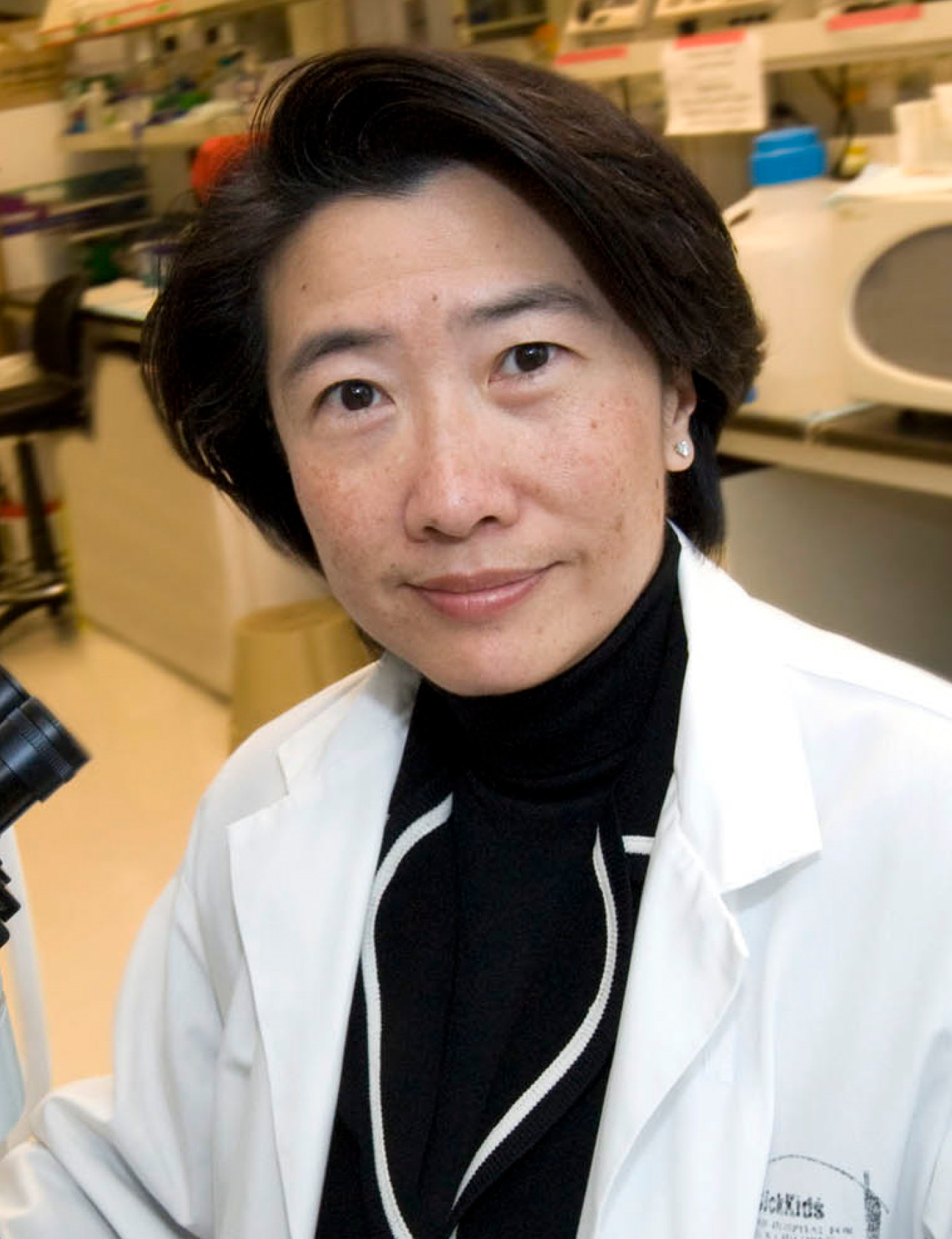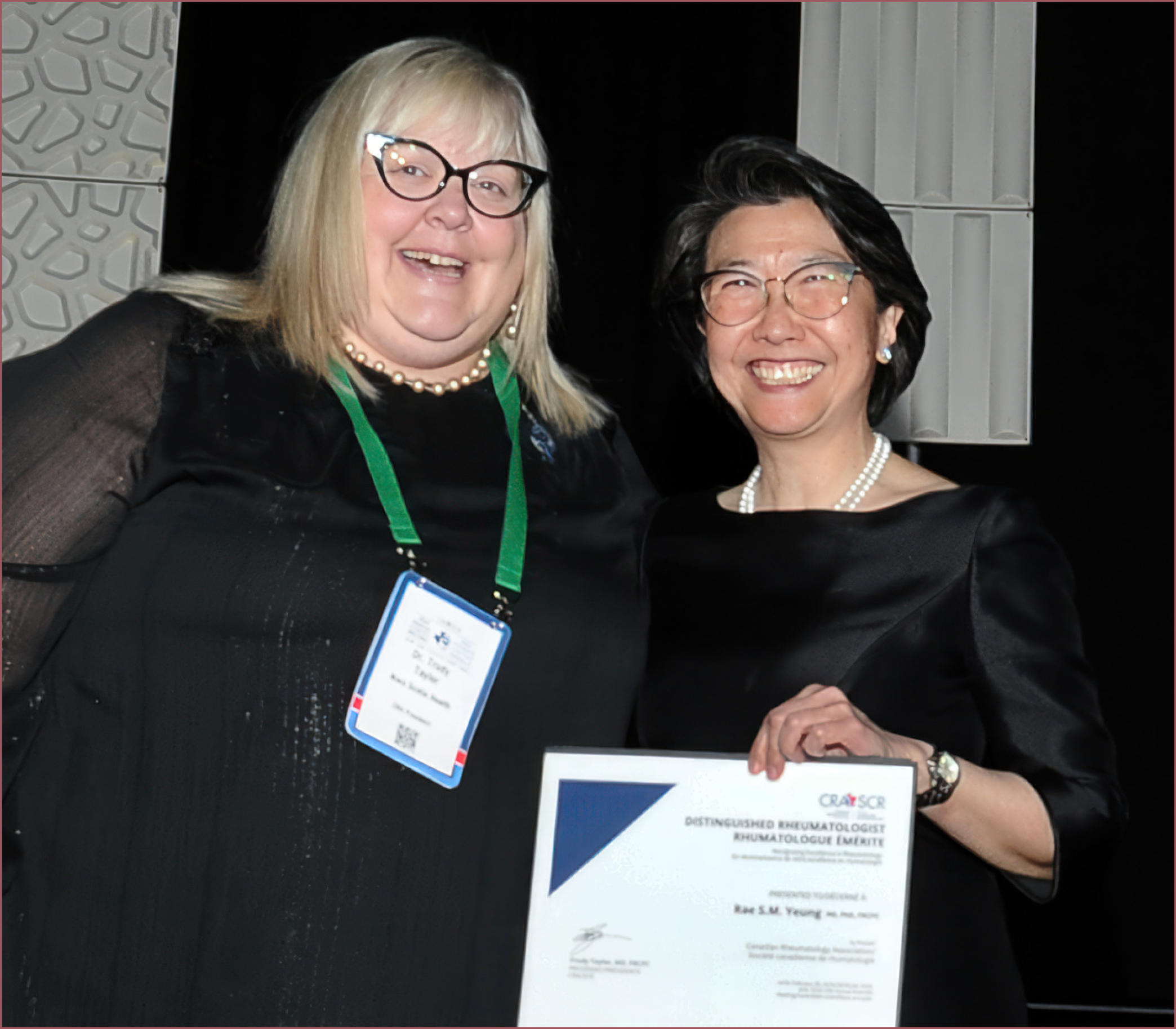Summer 2025 (Volume 35, Number 2)
The CRA's 2025 Distinguished Rheumatologist: Dr. Rae S. M. Yeung
Download PDF

Why did you become a rheumatologist? What or who influenced you along the way to do so?
My decision to become a rheumatologist was shaped by my doctoral training in immunology, which instilled in me a deep appreciation for the complexities of the immune system. I was motivated to use this knowledge in a clinical specialty where it could have a direct and meaningful impact on patient care. Rheumatology was the logical choice. I was also inspired by excellent clinicians who were rheumatologists—those who cared for the whole person, not just an isolated organ or symptom. Their holistic approach and unwavering dedication to understanding complex clinical problems really resonated with me and became a guiding principle in my career.
You are Professor of Paediatrics, Immunology and Medical Science at the University of Toronto, and Staff Physician and Senior Scientist at The Hospital for Sick Children. The central theme of your research is precision medicine in childhood arthritis and rheumatic diseases. You meld phenotype with biology to understand the mechanisms governing autoimmunity to further discovery of cellular and molecular tools for improved disease diagnosis, treatment, outcomes and prevention. The integrated program is reflected in linked clinical, research and educational activities that are internationally recognized. Your goal is to transform the treatment of affected children by defining the underlying biologic causes of their diseases to ultimately develop a precision medicine approach to improve outcomes.
To achieve this goal, you have established extensive partnerships in the clinic and in research to improve care, and to provide a family-focused opportunity for children to have an integrated experience with a multi-disciplinary team providing ongoing care and the opportunity to seamlessly participate in research. You have extended partnerships and established translational research platforms and consortia, serving as the founder and scientific director of local, national and international translational research networks to directly complement clinical care.
a) Can you tell us more about your research?
The central theme of my research program is precision medicine in childhood arthritis and rheumatic disease with a focus on arthritis and vasculitis. Making precision decisions means having the crystal ball and being able to predict who needs treatment, when and for how long and with which medicine. My research program uses genomic technology partnered with machine learning and artificial intelligence to help us gather the data and synthesize the evidence needed to guide these decisions.
b) Can you tell us about some of the research partnerships?
One example of research partnerships in childhood arthritis is UCAN. I established UCAN (Understanding Childhood Arthritis Network), a federation of research networks representing over 50 countries, serving as Scientific Director and developed best practices to ensure high quality translational research, enhance collaborations and improve research efficiencies. The UCAN framework and infrastructure has been a springboard for success in collaborative research projects and joint publications with increased efficiencies and value added for research. We launched regional cores in Utrecht, Toronto, and Singapore. Foundational efforts such as standard operating procedures, an integrated genomic medicine platform, care transformation tools, frameworks for national partnerships and benchmarking for societal impacts established by UCAN have been used as templates for other chronic and inflammatory diseases of childhood including COVID-19 associated conditions.
International collaboration in UCAN culminated in the 2016 London Declaration, where leaders of all major research networks in pediatric rheumatology signed an agreement “to improve care and ultimately cure childhood rheumatic disorders through worldwide collaboration.” The CARD Biobank at Sickkids is the Canadian hub of UCAN. UCAN is now supported by granting agencies in Canada and around the world with large-scale team grants funded by CIHR, Genome Canada, The Arthritis Society, ZonMw (the Netherlands), ReumaNederlands, EU-E-Rare and EU-Precision-Medicine funding schemes and Horizon 2020.
What is the greatest professional and organizational challenge you have faced, and how did you address/overcome this challenge?
Bringing amazing talent and brilliant minds together to think and act as one team is a huge challenge. Defining common goals and valuing everyone’s contributions have resulted in deep and lasting friendships that have overcome this challenge.
You and your team have used state-of-the-art techniques including cellular and animal models partnered with multi-omic and machine learning approaches to define the biologic pathways responsible for disease. Your work has improved understanding of disease etiology and pathogenesis, and more importantly has altered clinical practice. Knowledge generated in disease models has been translated to the bedside, resulting in improved understanding of the pathobiology of disease, biomarker identification, clinical trials, and a proposed new disease taxonomy integrating clinical and genomic data and improved clinical practice guidelines to manage affected children. Can you tell us more about your research and findings and their implications?
Expanding on the points discussed above—some of the most exciting research findings have been to identify good predictors for the problems outlined above—the crystal ball. Being able to identify which child with arthritis is at high risk for poor outcomes and who is not (predicting disease course). Being able to predict who will respond to which drug (predictors of treatment response) and when we can stop a drug (predictors of successful de-prescribing).
We have also identified new drug targets and new mechanisms of disease in Kawasaki Disease, leading to new treatments for affected children.
What do you foresee as challenges to Canadian rheumatologists in the future and what can individual rheumatologists and the CRA do to meet these challenges?
It is an incredible time to be a rheumatologist—with so many new tools to help us understand and treat disease. We have exponential growth in technologies in genomics and machine learning, partnered with many powerful new drugs targeting biologic pathways responsible for disease. Navigating the ever-growing complexities of biological and medical advancements will require a strategic approach. By fostering interdisciplinary collaboration, leveraging artificial intelligence tools, and committing to continuous education, we can make use of the vast amounts of data for the benefit of our patients and guide how to rationally make decisions to improve care.
In light of current events and the ongoing challenges of obtaining research funding, how resilient are international research networks?
Very resilient. I see international research networks with strong partnerships and team science as critical foundations and the path forward to overcoming these challenges. We are stronger together.

Dr. Rae S. M. Yeung receiving her award from CRA President
Dr. Trudy Taylor at the
CRA Annual Scientific Meeting in Calgary, which took place in February 2025.
What is the professional accomplishment of which you are proudest to date?
My academic family. So very proud of the people (my trainees/mentees), and programs (our teams in UCAN and KD) we have built together.
What do you believe are the qualities of a distinguished rheumatologist?
There are so many different ways to define this and all are meaningful—nicely stated in the CRA award.
What are some of your other passions outside of rheumatology?
Spending time with my friends and family.
You are marooned on a desert island? What book would you like to have on hand with you?
The Bible.
What is your favourite food or cuisine?
I enjoy all types of cuisine—as long as it’s good.
You are offered a plane ticket to anywhere in the world. Where would you like to go?
Somewhere I have not been before.
Rae S. M. Yeung, MD, PhD, FRCPC
Professor of Paediatrics, Immunology & Medical Science
University of Toronto
Senior Scientist and Staff Rheumatologist,
The Hospital for Sick Children, Toronto, Ontario
|
